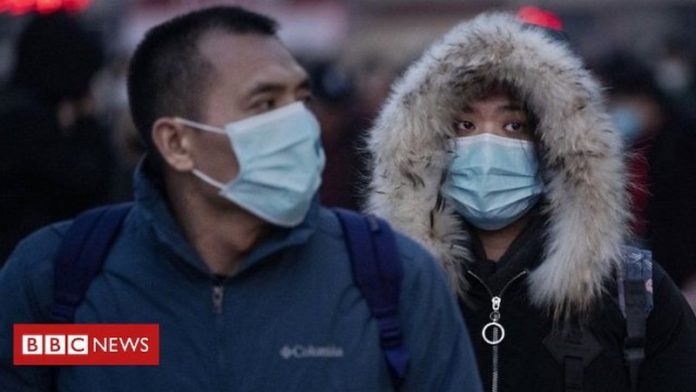The death toll from the coronavirus outbreak has risen to 170, and a confirmed case in Tibet means it has reached every region in mainland China.
Chinese health authorities said there were 7,711 confirmed cases in the country as of 29 January.
Infections have also spread to at least 15 other countries.
The World Health Organization (WHO) will meet on Thursday to again consider whether the virus constitutes a global health emergency.
SEE THIS:
- Federation of Muslim Councils appeals to EC to review voters’ registration exercise date
- Mahama to address Ghanaians on social media at 5:PM today
“In the last few days the progress of the virus, especially in some countries, especially human-to-human transmission, worries us,” WHO Director-General Tedros Adhanom Ghebreyesus said on Wednesday.
He named Germany, Vietnam and Japan, where there have been cases of people catching the virus from others who have been to China.
“Although the numbers outside China are still relatively small, they hold the potential for a much larger outbreak,” the WHO chief said.
More people have now been infected in China than during the Sars outbreak in the early 2000s, but the death toll remains far lower. Sars, also a coronavirus, caused acute respiratory illness.
Researchers are racing to develop a vaccine to protect people from the virus. One lab in California has plans for a potential vaccine to enter human trials by June or July.
How is China handling the outbreak?
Although questions have been raised about transparency, the WHO has praised China’s handling of the outbreak. President Xi Jinping has vowed to defeat what he called a “devil” virus.
READ ALSO:
- You need deliverance – Minister to critics of ambulance commissioning [listen]
- Alex Mould’s daughter would have turned 28 today
The central province of Hubei, where nearly all deaths have occurred, is in a state of lockdown. The province of 60 million people is home to Wuhan, the heart of the outbreak.
The city has effectively been sealed off and China has put numerous transport restrictions in place to curb the spread of the virus.
People who have been in Hubei are also being told by their employers to work from home until it is considered safe for them to return.
The virus is affecting China’s economy, the world’s second-largest, with a growing number of countries advising their citizens to avoid all non-essential travel to the country.
Several international airlines have stopped or scaled back their routes to China and companies like Google, Ikea, Starbucks and Tesla have closed their shops or stopped operations.
There have been reports of food shortages in some places. State media says authorities are “stepping up efforts to ensure continuous supply and stable prices”.
The Chinese Football Association has announced the postponement of all games in the 2020 season.


